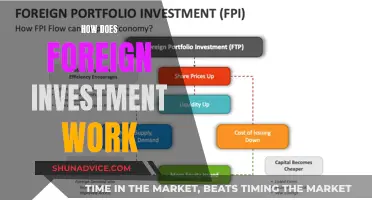
Investing in real estate can be a great way to diversify your portfolio and protect against inflation. However, it's important to note that not all real estate investments are created equal.
- Location, location, location: Look for areas with low property taxes, good school districts, and walkable amenities such as restaurants and parks. A low crime rate, easy access to public transportation, and a growing job market can also signal a healthy rental market.
- Do your research: Understand the local rental rates and property values. Know the landlord-tenant laws in your state and locale, including lease requirements, eviction rules, and fair housing laws.
- Consider the financials: Determine your budget and how you plan to finance the investment. Compare interest rates and loan requirements for different lenders. Calculate the potential return on investment, taking into account expected rental income, maintenance costs, property taxes, and other expenses.
- Time and effort: Investing in real estate can be time-consuming, especially if you plan to manage the property yourself. Consider whether you want to be a hands-on landlord or hire a property manager.
- Risk and liquidity: Real estate is considered a relatively illiquid investment, and there are entry and exit costs to consider. Think about your investment time horizon and whether you're comfortable with the level of risk involved.
- Strategy: Are you looking to buy and hold, or flip properties? Will you rent long-term or focus on short-term rentals like Airbnb? Each approach has its own pros and cons, so choose the one that aligns with your goals and resources.
| Characteristics | Values |
|---|---|
| Investment type | Rental properties, REITs, crowdfunding platforms, flipping properties, primary residences |
| Amount of money needed | Varies depending on the property, location, market conditions, and investment type |
| Time needed | Varies depending on the investment type |
| Advantages | Additional stream of income, diversification of investment portfolio, tax benefits |
| Disadvantages | More involved than other asset classes, illiquid investment |
What You'll Learn

Rental Properties
Understand the Market
Before investing, it is important to understand the market. Look for areas with low property taxes, good school districts, and walkable amenities such as restaurants and parks. A growing population, low crime rate, easy access to public transportation, and a thriving job market are also indicators of a promising rental market.
Crunch the Numbers
When considering a rental property, it is crucial to evaluate the numbers. Calculate the potential rental income, operating expenses (including repairs, property management fees, insurance, and property taxes), and expected cash flow. Compare these figures with the asking price and financing options to determine if the investment makes financial sense.
Screen Tenants Carefully
As a landlord, one of your most important tasks is screening tenants. Look for reliable tenants who will pay rent on time and take care of the property. Conduct thorough background checks and consider using a property management company to assist with tenant selection and eviction processes if needed.
Be Prepared for Maintenance and Repairs
Maintenance and upkeep costs can quickly eat into your rental income. It is recommended to set aside around 1% of the property's value for repairs and maintenance each year. Be prepared for emergency expenses, such as roof damage or appliance repairs.
Understand Landlord-Tenant Laws
Familiarize yourself with the landlord-tenant laws in your state and locale. Know your rights and obligations regarding security deposits, lease requirements, eviction rules, and fair housing laws. Seek legal advice if needed to ensure you are compliant with the relevant regulations.
Consider Hiring a Property Manager
Managing a rental property can be time-consuming and challenging. Consider hiring a property manager who can handle tasks such as arranging maintenance, screening tenants, and handling late rent payments. While this will incur additional costs, it can provide peace of mind and free up your time.
Investing: Inspired by Future Security
You may want to see also

Real Estate Investment Groups (REIGs)
In a typical REIG, a company buys or builds a set of apartment blocks or condos and sells them to investors. A single investor can own one or multiple units of self-contained living space, but the company operating the investment group collectively manages all the units, handling maintenance, advertising vacancies, and interviewing tenants. In exchange for conducting these management tasks, the company takes a percentage of the monthly rent.
A standard REIG lease is in the investor's name, and all the units pool a portion of the rent to cover vacancies. This means you'll receive some income even if your unit is empty. As long as the vacancy rate for the pooled units doesn't spike too high, there should be enough to cover costs.
REIGs are more hands-off than owning rentals directly, and they provide income and appreciation. However, they have fees similar to those associated with mutual funds, and they are susceptible to unscrupulous managers.
- Find a REIG with members who have similar goals and personalities as yourself.
- Ensure your investment goals, risk tolerance, and projections for realistic outcomes align with those of the group.
- Understand the structure and terms of the REIG before joining, and make sure you can uphold your end of any responsibilities.
- Conduct thorough research on the REIG, its members, and its investments.
Chipotle: A Smart Investment for Your Portfolio
You may want to see also

Real Estate Investment Trusts (REITs)
REITs provide an opportunity for everyday people to invest in valuable real estate, access dividend-based income, and help communities grow and thrive. They allow anyone to invest in portfolios of real estate assets, just like investing in other industries through the purchase of stocks or mutual funds. The stockholders of a REIT earn a share of the income produced without having to buy, manage, or finance property themselves.
There are different types of REITs:
- Equity REITs: These are the most common type of REITs, which own and operate income-producing real estate. They generate revenue primarily through rents.
- Mortgage REITs: These REITs provide financing for income-producing real estate by purchasing or originating mortgages and mortgage-backed securities. They earn income from the interest on these investments.
- Hybrid REITs: These REITs combine the investment strategies of both equity and mortgage REITs.
REITs are easy to buy and sell, as most trade on public exchanges. They offer attractive risk-adjusted returns, stable cash flow, and diversification to an investment portfolio. However, it's important to note that REITs don't offer significant capital appreciation since they must pay out 90% of their income to investors. Additionally, REIT dividends are taxed as regular income, and some REITs have high management and transaction fees.
When investing in REITs, it's crucial to consider the different types and their associated risks. Publicly-traded REITs tend to have better governance standards and are more liquid, making them a popular choice for investors. On the other hand, non-traded and private REITs may have higher account minimums, higher fees, and less transparency.
Madoff Victims: Lives Destroyed
You may want to see also

Online Real Estate Platforms
However, there are some disadvantages to using online real estate platforms. Some platforms only accept accredited investors, so they may not be accessible to everyone. Additionally, these platforms often charge management fees, typically around 1% annually, which can be higher than the fees charged by ETFs and mutual funds. The investments offered by these platforms tend to be relatively illiquid, with limited opportunities for redemption until a project is completed. It is also important to note that crowdfunding can be a riskier form of real estate investing, as some of the projects on these platforms may have been unable to secure funding through more traditional means.
- Fundrise: This platform is known for its high level of transparency, low costs, and excellent account services. It is open to both accredited and non-accredited investors, with a minimum investment of just $10 for brokerage accounts and $1,000 for individual retirement accounts (IRAs).
- EquityMultiple: This platform offers a diverse range of real estate investments and is ideal for accredited investors. It provides clear and comprehensive information about each investment opportunity.
- Yieldstreet: This platform offers access to a wide range of alternative investments, including real estate, commercial, legal, and art. It is open to both accredited and non-accredited investors, with a minimum investment of $10,000.
- RealtyMogul: RealtyMogul is accessible to both accredited and non-accredited investors and offers REIT funds and individual commercial real estate investments. It provides access to a diverse range of commercial real estate investments.
- CrowdStreet: This platform specializes in commercial real estate investments and is ideal for sophisticated real estate investors. It offers detailed documentation and videos for each investment opportunity.
Delinquent Utilities: Invest Wisely in Others' Defaults
You may want to see also

Flipping Properties
Understanding the Process and Risks
House flipping involves buying properties, often those that are undervalued or in need of renovation, and then selling them at a higher price, preferably within months to a year. While it can be profitable, it also carries risks, including financial losses, unexpected issues with the property, and legal issues.
Financial Planning
Set a realistic budget and secure your finances before getting started. Consider different financing options, such as home equity loans, hard money loans, or personal loans. Remember that you may need to cover renovation costs, holding costs (e.g., mortgage payments, property taxes, insurance), and potential unexpected expenses.
Finding the Right Property
Look for properties that fit your budget and renovation capabilities. Consider foreclosures, auctions, and short sales. Work with a knowledgeable real estate agent who has experience with house flippers and can help you find properties with the best potential for profit.
Due Diligence and Offer
Conduct thorough due diligence on the property. Inspect the property and estimate renovation costs. Calculate the ideal purchase price using the 70% rule, which states that you should pay no more than 70% of the after-repair value (ARV) minus repair costs. Make an offer on the property, including an inspection contingency to identify any hidden issues.
Renovations and Repairs
Work with trusted contractors to complete the necessary repairs and renovations. Create a comprehensive list of what needs to be done, along with estimated costs and timelines. Stay involved and regularly check in with the contractors to ensure the project stays on track.
Marketing and Selling
Once the renovations are complete, work with your real estate agent to market and sell the property. Set an appropriate sale price and be prepared to negotiate. Remember that not every flip is successful, so have a backup plan, such as renting out the property if you can't sell it for your desired price.
Green Investments: Improving Our Environment
You may want to see also
Frequently asked questions
There are several ways to invest in properties, including buying a rental property, using an online real estate platform, investing in Real Estate Investment Trusts (REITs), flipping properties, and investing in your own home.
When choosing a profitable rental property, look for a location with low property taxes, a good school district, and walkable amenities such as restaurants and parks. A growing population or a neighbourhood with a revitalisation plan can also signal a good investment opportunity.
Investing in properties can provide an additional stream of income, help diversify your investment portfolio, and reduce your tax bill. However, it can also be more time-consuming and involved than investing in other asset classes, and your money may be tied up as real estate is considered an illiquid investment.
The amount of money needed to invest in properties varies depending on the property, location, and market conditions. In some cases, you may only need a few thousand dollars to get started.
Investing in properties comes with risks, including high maintenance and property management costs, unpredictable vacancies, and the potential for losses if the property does not appreciate in value. It is also important to consider the time commitment required, as managing a property can be time-consuming, especially if you have multiple properties.
A Real Estate Investment Trust (REIT) is a company that owns, operates, or finances income-producing real estate. They collect rent and other payments from the properties in their portfolio and use those funds to pay dividends to shareholders. You can buy shares of a REIT through a brokerage account or a tax-advantaged retirement account.







